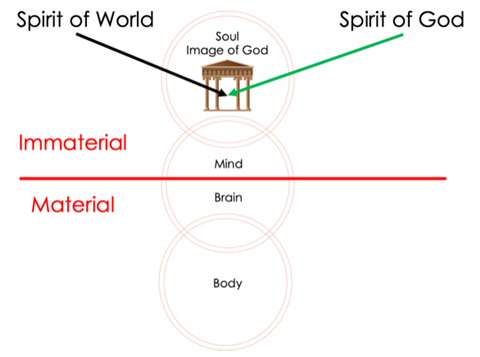Dr Erik Strandness explores the relationship between the soul, mind, brain, body and spirit following a recent Big Conversation about near death experiences
Scientific speculation over the nature of the mind and soul are fascinating topics but are more than academic curiosities because the conclusions that are drawn have a significant impact on the way we view humans and their role in society. The host of a recent ‘Big Conversation’ on near death experiences, Andy Kind, turned the guests’ attention to this larger question by quoting writer Marilynne Robinson from her book Absence of Mind:
“Whoever controls the definition of the mind controls the definition of humankind itself.”
Is she correct, and if she is, what does it mean to control the definition of humankind?
On the show, Sharon Dirckx noted that the way we view the mind crucially shapes the way we understand such topics as ethics, free will and even the development and use of artificial intelligence (AI). Emily Qureshi-Hurst, on the other hand, didn’t really speak to the consequences of reducing the mind to the brain but I suspect she might concur with many of her atheist colleagues who fear that over-spiritualising the cerebrum gives dangerous control of life’s narrative to those of a religious persuasion who don’t have such a great historical track record of getting along.
So, which view not only best explains the current neuroscientific data but lays the groundwork for human flourishing?
Soul building
In order to answer these questions, it will be helpful to define what we mean by soul, mind, brain, body and spirit because these terms are often used generically and interchangeably making it difficult to specifically address the issues at hand. I realise that not everyone will share my characterisation of these entities but for the purposes of this article they will serve as the background for my comments.
I think it’s fair to say that most people believe that humans are persons with unique physical bodies, housing unique personalities, who surprisingly share a common belief that the world is more than just matter. I believe the Bible provides us the with best explanation for these shared sensibilities.
According to Genesis, humans are physical beings built according to divine specifications. We bear the image of God, which is why we exhibit characteristics found nowhere else on the planet such as creativity, love, compassion, purpose, morality and worship. As the Psalmist noted, we began as an unformed substance known to God before we were born, which was then fearfully and wonderfully knit together in our mothers’ wombs to become a unique character in God’s ongoing story. (Psalm 139)
Read more:
Do consciousness and near-death experiences point to an afterlife?
Is there more to death than this?
Is there evidence for an afterlife?
What happens when you die?
St Paul later explained that our bodies are temples where the Holy Spirit dwells. Most of us have toured temples and cathedrals and noted that while they are all designed for worship they differ in their ornamentation and architecture, making each a unique vehicle of praise. I believe that the temples of which Paul wrote can be understood as our souls, each one beautifully constructed with peculiar acoustics such that when God’s children gather in worship, he hears a symphony of praise.
Genesis also notes that what distinguishes animals from humans is the breath of God. In other words, our souls, our temples, require that a spirit be present for the soul to actively express itself. It is therefore no surprise that most people believe in a spiritual realm and spend most of their lives auditioning spirits to take up residence in their Holy of Holies.
In summary, the spirit is the supernatural essence that animates us. The soul is the temple where that spirit dwells. The mind/brain is the interface between this inner immaterial duo and its outward expression. And the body is the uniquely crafted physical articulation of the mental activity generated when a spirit fills a temple.

Praise songs
Once our sanctuary is inhabited by a spirit it comes alive with worship, a worship that generates a very particular soul music shaped by the unique architectural acoustics of our individual temples. The mind then transmits this worship to the body through the brain and we see it physically manifested as the fruits of the spirit. The type of fruit we display is determined by the spirit we invite into our sanctuary because the one we choose will have a profound downstream effect on our soul, mind and body.
We have all encountered angry, ugly and sad souls, but the problem isn’t their image-bearing architecture but the spirit they have welcomed into their Holy of Holies, because as the Psalmist made clear – we become what we worship (Psalm 115). In a culture where people believe they need to physically change their appearance, politics and even their gender to fit in, it is reassuring to know that all they really need to do is toss out the spirit of the world who never knew them and replace it with a Holy Spirit who knew them before they were born.
“Now we have received not the spirit of the world, but the Spirit who is from God, that we might understand the things freely given us by God. And we impart this in words not taught by human wisdom but taught by the Spirit, interpreting spiritual truths to those who are spiritual.” (1 Corinthians 2:12-13)
Going up?
My schematic depicts a line between the immaterial and material realms, and it is here that the scientific debate occurs. Does an immaterial realm exist or is it just an illusion fobbed on us by a collection of mischievously collocating atoms? Do our lives have any upper floors or is the elevator stuck in the biological basement?
Ancient philosophers knew that something lay beyond the mortal coil and came up with explanations such as Plato’s realm of forms and Aristotle’s unmoved mover. These brilliant men, revered for their logic and reason, postulated something beyond the material realm and yet if they were alive today their ideas would have been shot down by many a scientist because they had entered forbidden metaphysical air space.
We speak of a higher calling. We seek purpose. We want our lives to have meaning. However, none of these things can be accomplished unless we view our lives from the top down. If you want to take stock of your life you cannot wallow in the basement, but must hop in the metaphysical elevator and take in the view from the upper floors. It appears that if you want your life to be significant you need to ask the Lift Operator if he is going up?
Get access to exclusive bonus content & updates: register & sign up to the Premier Unbelievable? newsletter!
Metaphysical junk mail
Why are we so anxious and depressed? Why are suicide rates increasing? Why do we have a meaning crisis? I would argue that it is the modernist intellectual victory that has resulted in collateral mental health casualties. When you reduce the mind to matter you lock it in a biological container, which is quite unfortunate because everything worth living for is only discovered when one thinks outside the box. It may be a safe space for materialist scientists but sadly becomes a coffin for those who want to get their heads in the clouds. You can’t access the transcendentals of truth, goodness and beauty when your mind is chained to matter.
Interestingly, one of the common features of near death experiences (NDEs) is a radically changed life. It appears life draws inspiration from encounters with an immaterial realm. Acknowledging a spirit, soul and mind dramatically opens the possibilities in life while materialism closes the scientific mind.
“If you read history, you will find out that the Christians who did most for the present world were precisely those who thought most of the next.” (CS Lewis)
Socrates said an unexamined life isn’t worth living, which essentially means that if you don’t step outside your material self and listen to the music of the spheres you will find yourself dancing alone to the tune of your selfish genes. No wonder suicide rates are rising, when we mine the physical world for significance we end up digging our own grave. As it turns out, it is treasure in heaven that pays the metaphysical bills which, since the enlightenment, are now long overdue because the materialists kept telling us it was junk mail.
Metaphor as science
Qureshi-Hurst thinks that the idea of the soul has symbolic meaning: “I think it’s a beautiful metaphor and I don’t think it’s any more than that.” Soul however is an immaterial concept, and I don’t see how a purely physical being would find it to be a useful metaphor in a purely material universe.
Metaphor is the literary equivalent of the scientific method because it takes concepts and places them in different contexts to test their validity, and as one accumulates more metaphors for a specific idea it attains greater literary and metaphysical significance. Metaphor is not a linguistic trick used by the religious to convince the non-religious to believe in the supernatural but takes the immanence of language and places it in a literary laboratory to prove the validity of transcendent truths.
Free will defence
It’s interesting that a great deal of fear has been generated over the technological advances of AI but no regret over the damage we have already done by reducing the human mind to a meat computer. I think Marilynne Robinson is correct that whoever controls the definition of the mind controls the definition of humankind and that this control has far reaching implications for our understanding of what it means to be human.
Human society is based on a larger immaterial vision that can only be adequately explained by those who spend time taking in the panoramic view of life afforded by the upper immaterial floors. Sadly, it appears to be above the biological paygrade of the materialist to explain the hard problem of consciousness, our pervasive obsession with spirituality and the human preoccupation with the transcendentals of truth, goodness and beauty.
Animals can have very efficient societies because Someone or something has imprinted an instinctual behaviour grid on their biology, which minimizes deviation and ensures success, but humans are different because they have this unique ability to screw things up. It appears that free will, while removing the constraints of instinct, necessitates that someone write a law on the human heart.
Blaise Pascal, commenting on consequences of free will, stated: “What a Chimera is man! What a novelty, a monster, a chaos, a contradiction, a prodigy! Judge of all things, an imbecile worm; depository of truth, and sewer of error and doubt; the glory and refuse of the universe.”
It appears that when you introduce creatures on this planet with free will who are incapable of policing themselves, you need Someone on the outside to reward that glory but also to take out the garbage.
The worship in our souls provides the liturgy of our conscience to which our mind is beholden and to which our bodies bend a knee. The modernist wants to close down the temple, the postmodernist wants to invite in every spirit of the world despite their shady credentials, but the Christian wants to enthrone the Spirit that knew them before they were formed in their mother’s womb.
It seems to me that a model of humanity that pays homage to the immaterial side of life which acknowledges a spirit, soul and mind does a better job of explaining both our human success and failure but also allows us to flourish beyond our biological means.
Erik Strandness is a physician and Christian apologist who practiced neonatal medicine for more than 20 years and has written three apologetic books. Information about his books can be found at godsscreenplay.com























